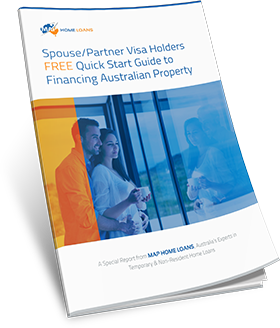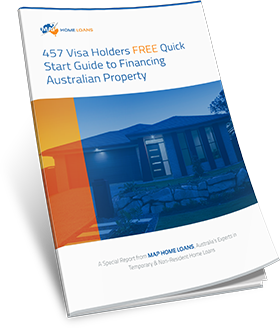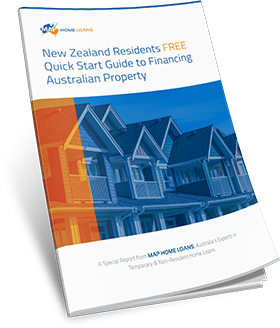Fast Home Loan Approval For All Visa Holders
- For any visa holders in Australia
- We approve when others said “no”
- Borrow up to 95% of the purchase price
- Competitive interest rates
- No cost, no obligation service
This page is for self employed temporary residents of Australia who have been granted a visa to establish a business or manage a new or existing business in Australia. Generally the non resident visa holder would be on a Business Owner visa such as a subclass 160,161,162,163,164 or 165.
Temporary resident business owners will be limited to an LVR of 80% thereby requiring a 20% deposit plus purchasing costs like stamp duty and legals. An LVR of 80% is the maximum available due to the lenders mortgage insurer being unwilling to insure a loan for self employed temporary residents over 80% LVR.
To qualify for a home loan standard self employed home loan rules apply. These rules require that self employed applicants provide 2 years financials/tax returns to prove their income and as a general rule, the bank will average the 2 years income figures to calculate your income for borrowing capacity purposes.
In some cases only one full years financials/tax returns will be required. This can work in the borrowers favour in circumstances where the most recent financial year shows excellent income but the previous year shows a smaller income/profit. Instead of averaging out the incomes to determine borrowing capacity we can take the income only from the most recent year which will result in a higher loan amount.
It is quite common for self employed applicants to not have up to date financials and tax returns. If the above rules were applied then self employed applicants without up to date financials would never be able to get a home loan until they had their most recent tax returns completed and the ATO had issued notice of assessments.
Low Document Home Loans (Low Doc) are specifically designed for self employed applicants in this situation who do not have their most recent tax returns and financials completed and up to date. Essentially, providing the borrower has enough deposit, clean credit history and ABN and GST registration for a minimum of 6 months, the banks will dispense with the usual requirement for 1-2 years full financials and tax returns. Instead of and in lieu of these documents some lenders will instead require one or two of the following;
The maximum LVR on a low doc for a self employed temporary resident is 60% thereby requiring 40% deposit plus costs like stamp duty and legals. Note, the 40% deposit can be equity in another property if the applicants already own property in Australia.
No. Whilst many lenders will not lend to self employed applicants who do not hold Australian citizenship or permanent residency, there are lenders that will lend in these circumstances and at normal standard interest rates and charges.
FIRB approval is required for all temporary residents unless an exemption exists. FIRB approval is not something to be feared though and is generally reasonably straight forward providing you are purchasing a residential property to live in. If you are looking however to buy an investment property then there are certain restrictions on what property you can purchase. For further information please see our page on the requirements for FIRB approval.
Lending policy for non residents varies widely with every bank having their own unique policy and requirements. This difference in lending criteria can result in one bank approving your home loan application whilst another would decline the application or require you to jump through some more hoops before approving. For example, some lenders will decline an application from a self employed temporary resident because;
This is where MAP Home Loans can help. MAP knows the complex self employed temporary resident home loan policy for all of the major mortgage lenders (banks and non banks) in Australia because we specialise in home loans for non residents.
Do not risk a decline (or another decline) on your credit file. We do not charge you for our services so give us a call or enquire online for a no obligation assessment.
Request an exploatory chat about your options and how to secure fast home loan approval, at a competitive rate – even if you don’t have a 20% deposit.

PeterGreat service, always attentive and let us know what would happen, how it would work, what was required etc. Craig goes the extra mile and is always available on the phone or email at anytime to explain things. Phenomenal Service. You won’t get better (Although first house purchase in Australia, this is my 4th house purchase and the best service yet by far!).
Chloe and Ben P.A and Chef from Auckland New Zealand on a 461 Visa, Bought a New Home in Brisbane QLDWe are so happy – I have no idea how I will get any sleep tonight. A big thank you for all your hard work and expertise!! Looking forward to catching up with you in person in the near future All the best and enjoy the weekend (and hopefully a few beers too) Thanks Craig!! Cheers Chloe & Ben
TheresiaThanks for your assistance. You’ve made my first home buying experience very easy & pleasant. I will for sure recommend your service if any of my friends is looking for home loan deals. Regards, Theresia

Almost there, please complete the form to request your..

In this Guide, you’ll discover…
Free Report LIVE 2020 WDS

Almost there, please complete the form to request your..

In this FREE phone consultation, you’ll discover…
And, much more – We will answer any of your questions!


In this Guide, you’ll discover…
We guarantee 100% privacy. Your information will not be shared.


In this Guide, you’ll discover…
We guarantee 100% privacy. Your information will not be shared.

Almost there, please complete the form to request your..

In this Guide, you’ll discover…


In this Guide, you’ll discover…
We guarantee 100% privacy. Your information will not be shared.


We allow you to…
We guarantee 100% privacy. Your information will not be shared.


We allow you to…
We guarantee 100% privacy. Your information will not be shared.


We allow you to…
We guarantee 100% privacy. Your information will not be shared.


We allow you to…
We guarantee 100% privacy. Your information will not be shared.

Almost there: please complete the form to request your…
We respect your privacy